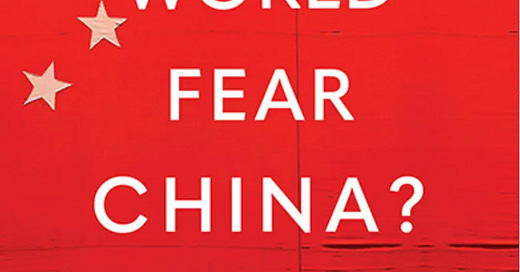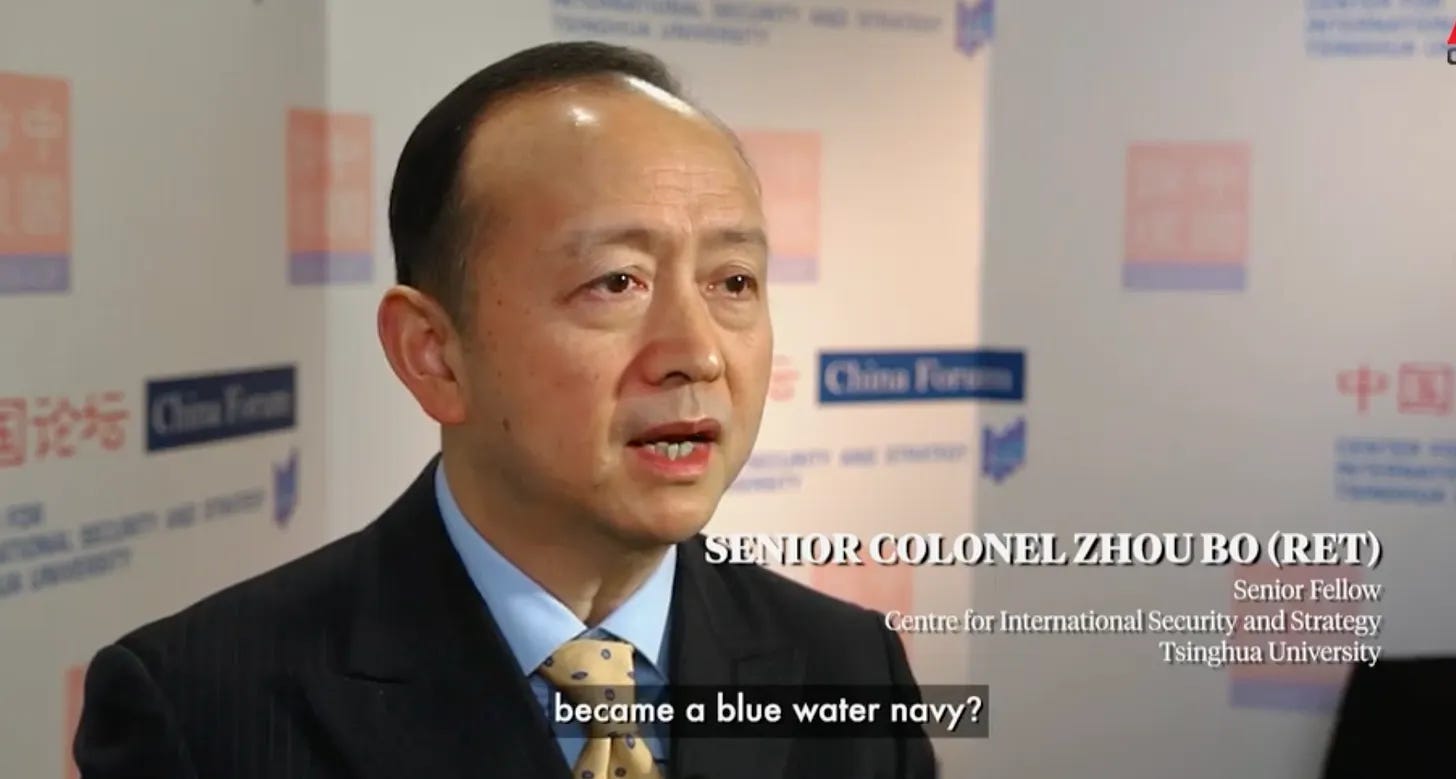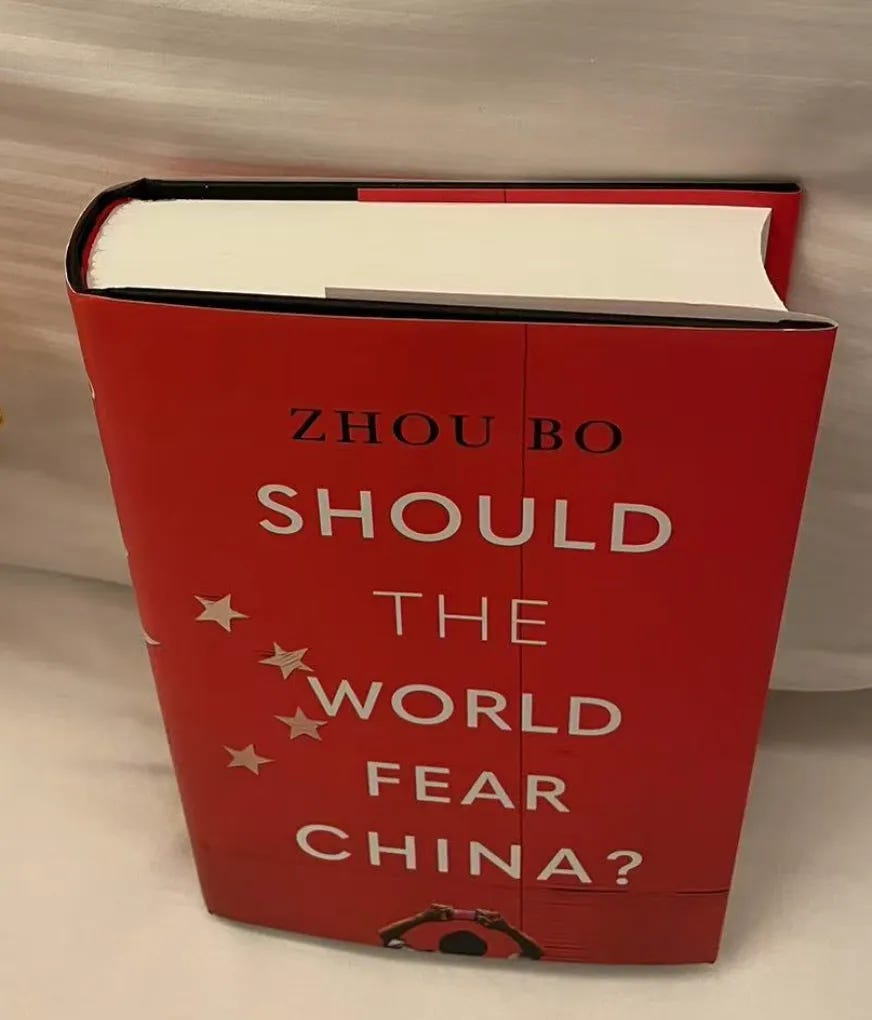Book excerpt: Should the World Fear China?
Former senior colonel of PLA Zhou Bo clarifies West's doubts on China
Good evening. Today's piece is an excerpt from the book SHOULD THE WORLD FEAR CHINA?, authorized by Zhou Bo, the author of the book, and Hurst Publishers, London. Zhou is a retired senior colonel of the Chinese People's Liberation Army (PLA).
A week ago, Zichen Wang published an excerpt from Zhou's book on Pekingnology. I've cross-checked his selections and confirmed that apart from the section on China-U.S. relations, the excerpts shared today largely differ from his.
Zhou started his military service in 1979. He served in different posts in Guangzhou Air Force Regional Command. From 1993 he worked successively as staff officer, Deputy Director General of West Asia and Africa Bureau and then Deputy Director General of General Planning Bureau of the Foreign Affairs Office of the Ministry of National Defense of China, Chinese Defense Attaché to the Republic of Namibia and Director of the Centre for Security Cooperation in the Office for International Military Cooperation, Ministry of National Defense.
Zhou is now a senior fellow of the Center for International Security and Strategy (CISS) at Tsinghua University.
Zhou is an under-graduate of Air Force Engineering College and a postgraduate of St Edmund College of Cambridge University (Mphill in International Relations). He was a visiting fellow to the Land Warfare Studies Centre of the Australian Army in 1999. He has attended various courses at Harvard University, Westminster University, PLA National Defense University, PLA University of Science and Technology for the National Defense, and PLA Army Command College (Shijiazhuang).
You can now order the book SHOULD THE WORLD FEAR CHINA? on Amazon or purchase it from local bookstores (now available in UK).
Table of Contents
Introduction
1. Managing China-US Relations
2. Living in Amity with Neighbours
3. Safeguarding China's Interests
4. Shouldering China's International Responsibilities
5. The Future of the International Order
Acknowledgements
Index
Below is an extract from SHOULD THE WORLD FEAR CHINA?, © Zhou Bo, 2025. It is published in cooperation with Hurst Publishers, London. The subheadings are my summaries -- Jiang Jiang.
INTRODUCTION
China-U.S. Relations
It is not unusual to hear the Chinese talking about the U.S. trying to contain China. My answer is, even if the US wants to contain China, it can’t. The United States is tired of policing the world. Therefore, it is refocusing on the new center of gravity, which is obviously the Indo-Pacific, where the U.S. sees endless opportunities but also a fierce strategic competitor—China. But America’s global retrenchment will be a gradual process, in part because the U.S. allies will hold it back. Europe’s strategic autonomy won’t take shape in the next ten years, if at all. Israel’s confidence in being able to stabilize the Middle East in its own favor has crumbled thanks to the war in Gaza.
......
Are China and the U.S. destined for war? This should be one of the overriding questions for the twenty-first century. There are two scenarios that might trigger a conflict between the PLA and the U.S. military—the South China Sea and the Taiwan Strait. Contrary to what most people think, I believe the South China Sea is far more dangerous than the Taiwan Strait. In “War in the Taiwan Strait? It’s the South China Sea, stupid”, I pointed out that a war in the Taiwan Strait between China and the U.S. is very unlikely to be triggered by an accident like we saw in the South China Sea. The Taiwan issue is so flammable, every word from Beijing and Washington would be scrutinized. However, there is no easy way to deconflict in the South China Sea. American military aircraft regularly conduct close surveillance and reconnaissance in China’s exclusive economic zones. U.S. naval vessels sail through waters off the islands and rocks in the South China Sea over which China claims sovereignty. But an ever stronger PLA can only become more determined in checking what it believes to be American provocations. Since neither wishes to back down, I assume—and I hope I am wrong—that it is only a matter of time before another deadly collision like the one in 2001 between a Chinese jet fighter and an American spy plane reoccurs.
Although the South China Sea is more dangerous, it is hard to say that a collision at sea or in the air, even deadly, will surely trigger a conflict. The only issue that could drag China and the U.S. into a full-blown conflict is over Taiwan. How likely is that? U.S. Secretary of Defense Lloyd Austin said at the Shangri-La Dialogue in 2023 and again in 2024 that a conflict with China was neither imminent nor inevitable. Such an assessment is a welcoming denial of the irresponsible remarks made by some American generals and admirals when they predicted when and how mainland China might attack Taiwan.
The conflict in Ukraine also gives people food for thought. If NATO, an alliance of 32 states, hesitates to take on Russia, then what gives the U.S. absolute confidence to fight China far away from its shores with a few half-hearted allies on China’s doorstep? China’s economy is ten times larger than Russia’s while its defense budget is three times bigger. The 2 million-strong PLA is the largest military in the world and the PLA Navy outnumbers the U.S. Navy in ships. The only obvious advantage Russia has over China is its store of nuclear warheads, the biggest in the world. Should China decide to increase its nuclear arsenal, it is only a matter of political decision.
How can war be avoided in the Taiwan Strait? My answer is simple: let China believe peaceful reunification with the island is still possible. So far there is no indication that Beijing has lost confidence or patience. China has never announced a timetable for reunification. It is still talking about peaceful development of cross-strait relations. But provocations from either Taipei or Washington will be checked with more robust responses from the PLA. They will lead to a new, irreversible status quo that favors the mainland. For example, after former U.S. House Speaker Nancy Pelosi’s Taiwan visit, the PLA conducted four days of live-fire exercises around the island. Now the median line in the Taiwan Strait that was tacitly observed by both sides no longer exists. Chinese fighter jets regularly fly to the other side of the line in different sorties.
For peace to prevail in the Taiwan Strait, as I have written in Foreign Affairs, the United States should reassure China that it has no intention of straying from its professed commitment to the “One China” policy. U.S. leaders have refused to enter into direct conflict with Russia over Ukraine despite the extent of Russian transgression. Equally, they should consider war with China a red line that cannot be crossed.
China-India relations
With the center of global power shifting from West to East, the Asian Century that Chinese leader Deng Xiaoping described to Indian Prime Minister Rajiv Gandhi in 1988 appears to be dawning. Can the dragon and the elephant coexist? The Chinese and Indian militaries had a deadly brawl in the border areas in 2020 resulting in the death of four Chinese soldiers and twenty Indian soldiers—the first case with casualties in over 40 years.
Despite regular meetings between front-line senior military officers; efforts to deconflict in the most dangerous areas along the Line of Actual Control; and even record-breaking bilateral trade, the relationship is still chilly. India places the border issue almost as a precondition for improving bilateral ties. This doesn’t look like a wise policy. India doesn’t only have territorial disputes with China. If Pakistan says to India that their relationship won’t improve unless they agree to resolve the Kashmir issue, what will India do?
China–India relations are about more than the border issue now. India frets about China’s increased economic and military presence in the Indian Ocean while China is wary of India drawing closer to the US. With China–US competition intensifying, Washington naturally needs New Delhi, just as it needed Beijing during the Cold War to counterbalance Moscow. People often read in the media that China and India are jostling for leadership of the Global South. This is incorrect. China’s economy is five times larger than India’s. Even if India could sustain an average annual growth of about 5 percent, its gross domestic product will still only be where China’s is today in around 2050. So it is impossible for India to become the Global South leader if China remains a member of the Global South.
In my op-ed for the South China Morning Post, I expressed my hope that China and India will become Global South anchors, not power competitors.
The price to pay for being a global power
Once at an international seminar, I heard what I thought was the most intriguing question: what is the most ideal world for the Chinese people, in which most of the Chinese are happy, but foreigners can also survive? I don’t think there is such a world. Although the twenty-first century might indeed be an Asian century, unlike Pax Britannia in the nineteenth century and Pax Americana in the twentieth, the twenty-first century won’t be Pax Sinica. Instead, this Asian century will be characterized by the collective rise of nations, including China, India and Indonesia, etc, and regional organizations like ASEAN and BRICS.
However, this question does raise an issue of how China might live with others. Thanks to China’s seemingly inexorable rise, nowadays everything that doesn’t seem to have anything to do with China eventually ends up having something to do with China. This is particularly the case with the war in Ukraine—a faraway conflict that China is not involved in. China was nevertheless asked which side it would take; whether it would become a mediator between Russia and the West; and whether it might seize the opportunity to launch an attack on Taiwan. Is this unfair to China? As I wrote in the Financial Times, this is the price to pay for being a global power.
......
A global power has two things that are not found in a small country—huge overseas interests and greater international responsibilities. In “The future of the PLA,” in Foreign Policy, I argue that in spite of China’s territorial disputes with some countries, a major power like China should look beyond its borders into the horizon to protect China’s overseas interests and shoulder more international obligations.
The need to protect China’s overseas interests is easy to understand, but what exactly are China’s international responsibilities? China’s success in restoring diplomatic ties between Iran and Saudi Arabia is a turning point in Chinese diplomacy. It indicates not only China’s willingness but also capabilities in shouldering its international obligations. The signing of the Beijing Declaration by 14 Palestinian factions is another good example of how China can play a role as an honest broker in a most volatile region. In my interview with Time magazine, I said that when China started to reform and open up, it was trying to “cross the river by feeling the stones on the riverbed,” as Deng Xiaoping said, but now China is entering the ocean. You can’t feel the seabed. These are uncharted waters, but there is no turning back.
NATO
If a group of small nations comes into alliance to resist major powers, the rationale is understandable. But if, say, the US, the strongest nation on earth, would ally itself with other countries, apparently it is not for self-defense. NATO is not only a military organization, it is also a political one. It is a stick of the West to defend and spread its values. It needs “threats” to survive and thrive. The fact that Finland and Sweden joined NATO might prove its popularity, but as I wrote at the invitation of The Economist, the more popular NATO becomes, the more insecure Europe will be. Europe’s security is essentially how NATO and Russia might coexist. French President Macron once said NATO is braindead. I said to Die Zeit and Bloomberg that it is a zombie that is still walking.
Of the five nuclear states that have signed the Treaty on the Nonproliferation of Nuclear Weapons (NPT), China is the only country that has declared not to be the first to use nuclear weapons and not to use or threaten to use nuclear weapons against non-nuclear states or nuclear-weapon-free zones. In Foreign Policy, I argue that all nuclear powers could afford to adopt a formal no-first-use policy—taking the moral high ground without reducing their capabilities for retaliation. In Europe, NATO can start with a unilateral no-first-use pledge against Russia as a gesture of goodwill. Even if such an offer isn’t immediately reciprocated by Russia, it might begin to thaw tensions. As a second step, NATO could pledge to halt any further expansion of its alliance in exchange for Moscow adopting a no-first-use policy. In Asia, China and the United States could reach a similar agreement, thus de-escalating potential conflicts involving.
Loved? Feared?
My most influential op-ed is on how “China can use its leverage with Russia to prevent a nuclear war,” published in the Financial Times in October 2022. At the end of my article, I said in the most straightforward manner that if Putin now opens a nuclear Pandora’s box that was kept closed even during the Cold War, it would be a moment of infinite stupidity. I further argued that China can help the world by simply telling Putin: don’t use nuclear weapons, Mr President. I am happy that not using nuclear weapons in Europe is now a crystal-clear Chinese policy towards the war in Ukraine. If China’s rise is already a given, then can a global China help to make the world safer, if not better? This is the ultimate question. As I have expressed in this book, my best hope for my country in the twenty-first century, is that it will maintain some pleasant features of the Tang Dynasty. Tang China was prosperous, multiethnic, cosmopolitan and inclusive. It was home to “foreign” religions ranging from Buddhism, Nestorianism, Zoroastrianism and Islam to Manichaeism. It shows that a great power that is next to none can be confident but humble, and loved rather than feared.
First published in the United Kingdom in 2025 by C. Hurst & Co. (Publishers) Ltd., New Wing, Somerset House, Strand, London, WC2R 1LA
Copyright © Zhou Bo, 2025
All rights reserved.
Distributed in the United States, Canada, and Latin America by Oxford University Press, 198 Madison Avenue, New York, NY 10016, United States of America.
The above is an excerpt from the book SHOULD THE WORLD FEAR CHINA?, © Zhou Bo, 2025, authorized by Zhou Bo and Hurst Publishers, London (www.hurstpublishers.com). The subheadings are my summaries -- Jiang Jiang.






